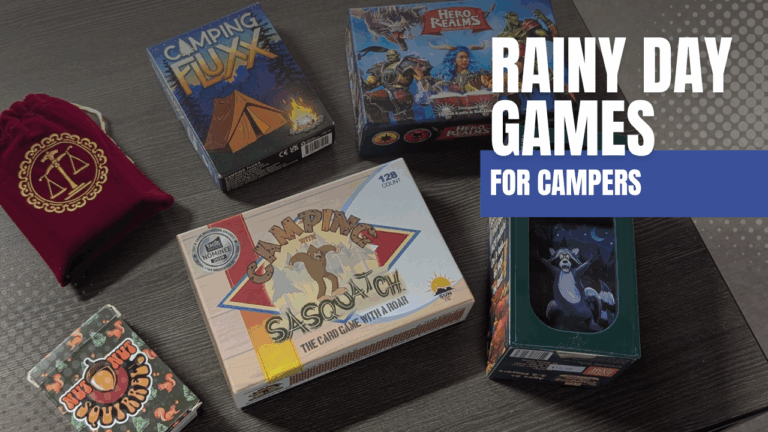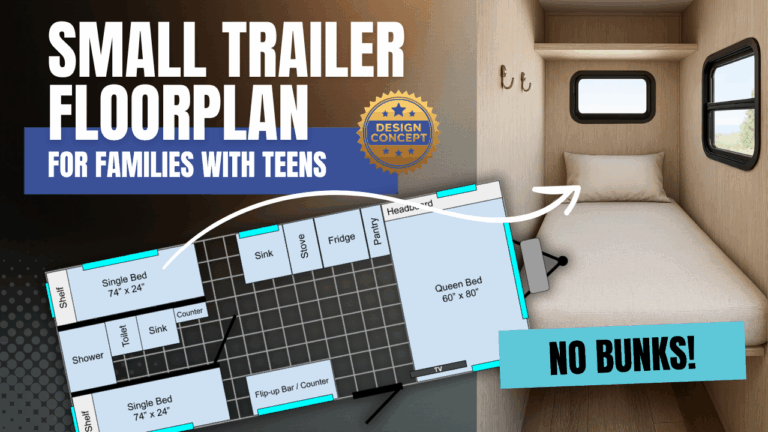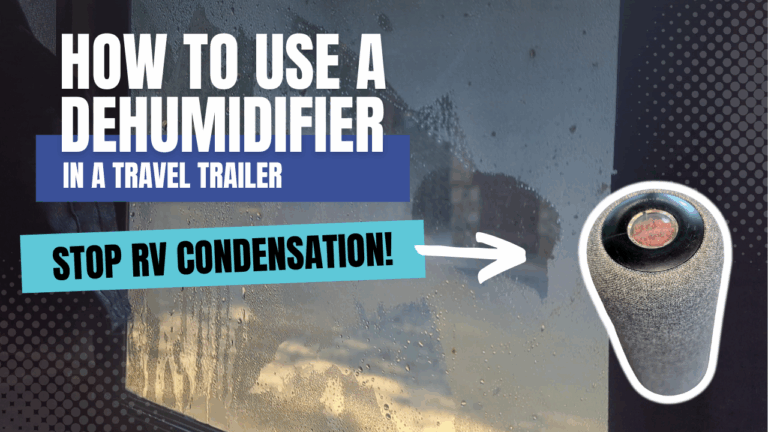We’re going to talk about how long we can dry camp comfortably in our trailer. The length of time that you could dry camp can range drastically depending on several different variables. I am going to go over our experience with dry camping and do my best to set some realistic expectations, but just know if you want to push these limits, you should be able to, you’ll just need to conserve a little bit more than we typically do. First we’ll talk about power consumption and then propane, and then we’ll talk about the tanks.
Rogina Roaming is supported by its audience. When you purchase through links on our site, we may earn an affiliate commission at no extra cost to you.
Power
So when we first got our trailer, we had two six volt lead acid batteries. These batteries could not be depleted more than 50%, and when we went dry camping, we really relied on the solar to recharge our batteries. We really needed the solar to bring back the batteries every day so that we would have enough battery power to get us through to the next day.
When we camped with that original setup a two night, just standard weekend, Friday through Sunday, that was really our max unless we could get good solar. If we were camping in the fall and we knew that it was going to take longer to recharge those batteries, a standard weekend was really as long as we could go.
The first night we’d be fine, but that first day, if the batteries did not charge up at all from the solar, then that night we’d start conserving energy because we really wanted to make sure that the batteries wouldn’t get below 50% over the following night.
To conserve energy we would do things like we wouldn’t use our awning light. We would take our lantern outside and when we were inside, we would only turn on the lights that we needed. So we’d normally only have one light on at a time, just use what was needed and nothing more. We would also make sure to keep the TV off and not use any extras like that.
We were always fine. It always worked out and wasn’t a problem. We were probably being a little bit overcautious, but we didn’t want to ruin our batteries. We wanted them to be able to last.
So now we’ve done a big solar upgrade on our trailer. We have an extra panel up top, we changed our batteries instead of the lead acid we now have three 100 amp hour battle born batteries, and we added an inverter.
So we did a pretty big upgrade, but when we did that, we made sure to upgrade our battery bank large enough that we could comfortably camp for an extended weekend and not have to worry about the solar recharging our batteries. It is great when the solar can recharge the batteries, but depending on the situation, that doesn’t always work out. Most of the time it does, but it’s nice to not have to rely on it.
So our battery bank is large enough that we could camp comfortably and not have to worry about it. Power is just a complete non-issue for us. Now, our standard camping trips are just the weekend anyways, so either just the standard weekend Friday through Sunday or an extended weekend like Friday through Monday, maybe Thursday through Monday. But nothing too extreme. We just kind of camp for a long weekend. And so what we have, the 300 amp hour battle born batteries, those work great and we never have an issue running out of power.
When we did our solar upgrade, we also upgraded our solar charge controller. So the one that came with the trailer was what’s called a PWM charge controller, and now we move to what’s called an MPPT. The MPPT is more efficient, so the batteries can actually charge faster from solar than they were able to before.
I think that we would be fine with power with our solar setup for several weeks. We haven’t actually tried that though. Like I said, we normally go on shorter weekend trips. The longest that we’ve dry camped with this solar system has been a week and power has not been a problem at all. So I really think as long as you are in a situation where you can take advantage of the solar panels, you would be fine with power for several weeks.
Propane
Okay, now let’s talk about propane. Our trailer has two 20 pound propane tanks and they can automatically switch over. So when one tank goes empty, the other tank can automatically switch over and start being used.
Now we don’t use that system. We actually prefer to manually switch it over just because we like to know when one of the tanks is empty so that we make sure to get that refilled and that way we always have one full tank on the trailer so we don’t have to worry about if we have enough propane.
We use the propane for the furnace, the water heater, the quick connect outside, the stove and the refrigerator.
We refill each tank about once a year. The trailer really doesn’t go through that much propane. The fridge is super efficient. I think the furnace probably uses the most propane, but we don’t run it that often. So it’s not a problem.
If you have both tanks filled with propane, that can easily last you several weeks if not months. It just depends on use. For us, if we have at least one tank full, we never worry about running out.
Tanks
The real limitation that we have when it comes to dry camping is the tanks, specifically the black tank. But let’s save that for last. First, let’s start with the freshwater tank.
We have a 55 gallon freshwater tank, which is massive. And in addition to that, we also bring somewhere between four to six gallons of fresh drinking water. We use our drinking water to fill water bottles, for coffee, and for cooking. And then we use the water from the fresh water tank for cleaning the dishes, for washing hands, and also for the dog water. And we also use it if we end up using the outdoor shower.
We have never used a full 55 gallons. For a standard weekend we use a third of that at most, I would think that you could easily have this freshwater tank last for a week, if not more.
The gray tank is 30 gallons, and we rarely fill that more than a third. The gray tank is where the sinks and the shower drains to. Now we don’t use our shower, we converted it to a closet. If we want to shower while we’re camping, we’ll just use the showers at the campground. Or if we need to clean the kids off, we’ll just use the outdoor shower and just have them be in bathing suits. So that does help us conserve the gray water as well.
The other thing that we do to conserve our gray water is we actually keep a bucket in our kitchen sink. So instead of having all the water go down the drain there, we catch it in a bucket. It’s actually a collapsible sink basin from our tank camping days, but it fits perfectly in the sink. And so we just keep that there.
So instead of dumping the kitchen sink water into the gray tank, we catch it and then dump it outside. So sometimes a campground will have a dedicated area where you can dump gray water, so we could dump it in there, and other times we’ll just use it to put out the fire.
And then if the gray tank is looking pretty empty, then towards the end of the trip we’ll just take the bucket out and we’ll just let the water go down the gray tank because having some water in the tank does help clean out the black tank.
And then lastly, let’s talk about the black tank. Our black tank is 30 gallons. The black tank is where the toilet drains to, and for us, this is the weak point while dry camping. We have a family of four, and if all of us are using the trailer toilet for everything every time, then we have a max of a long weekend. So three nights before our black tank is showing full.
Now, if you have a lot planned and you’re not just hanging out at camp the whole time, then chances are you’ll use the bathroom while you’re out and about. And so that saves your black tank too. So if we have a busier weekend where we’re out doing more, then our black tank will last longer. And if we’re worried about the black tank, then what we’ll do is we’ll have the adults use the campground bathrooms during the day, and we’ll just have the kids using the trailer bathroom. And then at nighttime, anybody could use it. But that helps save some space in the black tank as well.
So for a group of four, if everybody is using the trailer the whole time, you’re not going anywhere else to use the bathroom, then I’d say you have three nights max. But you can easily extend that by having at least some members of the group use other facilities for at least part of the time.
The other thing worth mentioning about the black tank is the sensors are really terrible. It is really hard to know when the black tank is getting full because they’re just completely inaccurate. It will often read as two thirds full when we first get there and we know we have an empty tank, it’s just all over the place. And so you really have to use your best guess. So it’s possible that we can actually fill the black tank much more than we do, but we just really don’t want to chance overflowing it.
Conclusion
So to answer the original question, we can comfortably camp for a long weekend, for three nights. We can comfortably dry camp for three nights, for a long weekend.
At that point, our black tank is the problem. If we want to extend that time, we can find other bathroom facilities to use to help extend the black tank. If we make other bathroom arrangements, we can easily go a week.
At that point, we might need extra fresh water. As long as we can get some, then we should be good even longer.



